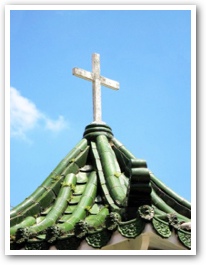Beijing's war on Christianity
- FATHER RAYMOND J. DE SOUZA
Four Catholic bishops in China have been abducted this past week, forcibly taken to unknown locations by the Chinese regime.
 |
Bishop Joseph Junqi of Guangzhou has been missing for days and also presumed abducted. Priests have gathered in the house of Bishop Paul Pei Junmin of Liaoning, both praying with him and serving as a bodyguard, hoping to prevent him from being seized.
Why are the Chinese Communists kidnapping bishops? They are forcing them to participate in the ordination, scheduled for today in Shantou, of Father Huang Bingzhang as a bishop – an ordination for which the necessary papal approval has not be granted.
The Chinese government, as part of its persecution of Catholics, long ago set up its own parallel, government-run church. Catholics are "free" to worship as long as they pay obeisance to the People's Republic rather than maintain loyalty to the Pope.
The Holy See, convinced that Chinese totalitarianism will be cast upon the ash heap of history sooner rather than later, has patiently sought to minimize divisions between the official church run by Beijing and the underground Church loyal to Rome. To that end, the Holy See has, on occasion, given approval to candidates for bishops proposed by the Chinese regime. There was tacit agreement, if not formalized, that no bishops – whether official or underground – would be consecrated without approval from Rome. In this way, the Holy See hoped to anticipate the day when official and underground Catholics will worship openly, united in freedom.
Last year, the Chinese regime broke the working agreement, as is their habit on all matters regarding Sino-Catholic relations. They illicitly ordained a bishop without papal approval, literally dragging an elderly bishop to the ceremony, forcing him to participate. A few weeks ago, they did it again. Today they plan another ordination, with more bishops being forced to participate by violence.
All communist regimes persecute the Church, but the Chinese are bolder still in attempting to create their own. The recent intensification of violence against bishops gives the lie to the conventional wisdom of the foreign-policy establishment, namely, that as China becomes more prosperous and engaged in world affairs, it will become more liberal on human rights.
All of which poses a delicate challenge for Canada's new Foreign Minister, John Baird, who will arrive in China this week. In choosing to make an early visit to China, Mr. Baird wishes to signal the importance he places on the Chinese relationship. Yet the visit will also prove a test for whether Mr. Baird will run his department, or whether the foreign ministry will run him.
Unlike many of his predecessors, Mr. Baird believes fundamentally in personal liberty and the need to stand up to tyrants. Not for nothing did he name his cat "Mrs. Thatcher." Since his appointment, he has spoken enthusiastically about implementing the Conservative campaign promise to create an office of religious freedom within the foreign ministry. Arriving in China at a time of escalating religious persecution gives him the opportunity to take a strong stand for religious freedom and against tyranny.
|
The recent intensification of violence against bishops gives the lie to the conventional wisdom of the foreign-policy establishment, namely, that as China becomes more prosperous and engaged in world affairs, it will become more liberal on human rights. |
The challenge will not be so much from the Chinese as from Mr. Baird's own department. The Chinese know that abducting bishops is outrageous behaviour, but they do it because they can get away with it. We do not earn their respect, only their disdain, if we are willing to silence our principles in order to, for example, sell them more pork bellies. Communists are men of cold calculation. They will expect our new Foreign Minister, if he is his own man and in command of his files, to speak frankly to them.
Yet the Canadian foreign ministry, which prizes Chinese approval above all things, will be giving Mr. Baird urgent counsel to say nothing, or at least nothing substantial, about religious liberty. Its bureaucratic leadership has long regarded human rights as a rather tedious distraction, and religious liberty is the most tedious human right of them all. It is no secret that the office of religious liberty is not popular in the bureaucracy, and every attempt will be made to neuter it, should it ever get off the ground. If the new Foreign Minister can be persuaded to look the other way on the abduction of bishops, the foreign ministry will conclude that he can easily be rolled on the religious freedom office.
Mr. Baird's trip to China is not only about the mandarins abroad, but the mandarins at home.
 This is Meaghen Gonzalez, Editor of CERC. I hope you appreciated this piece. We curate these articles especially for believers like you.
This is Meaghen Gonzalez, Editor of CERC. I hope you appreciated this piece. We curate these articles especially for believers like you.
Please show your appreciation by making a $3 donation. CERC is entirely reader supported.

Acknowledgement
Father Raymond J. de Souza, "Beijing's war on Christianity." National Post, (Canada) July 14, 2011.
Reprinted with permission of the National Post and Fr. de Souza.
The Author
Father Raymond J. de Souza is the founding editor of Convivium magazine.
Copyright © 2011 National Post

